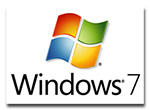 Microsoft has announced the various editions of Microsoft Windows 7 today. They believe most customers will gravitate towards one of two editions – either Windows 7 Home Premium for consumers, or Windows 7 Professional for business users.
Microsoft has announced the various editions of Microsoft Windows 7 today. They believe most customers will gravitate towards one of two editions – either Windows 7 Home Premium for consumers, or Windows 7 Professional for business users.
There are some major changes coming, and while some were clearly needed, others will be met with derision. The biggest/worst decision as far as future netbook owners should be concerned, is that the OEMs producing netbooks will probably be selling them with Windows 7 Starter. That’s what Microsoft wants to happen.
Windows 7 Starter only allows you to run three applications at a time. Forget about the fact that many of us are using the Windows 7 public beta (which has the “Ultimate” feature set) and that it runs just fine on netbooks. Hopefully most of the netbook makers will offer something other than Windows 7 Starter, for not much more. It’s a software limitation that doesn’t match the fact that by the time Windows 7 is available for retailers, the netbook hardware will be quite a bit faster and better than the first generation from this time a year ago.
From the Microsoft press release:
The first change in Windows 7 was to make sure that editions of Windows 7 are a superset of one another. That is to say, as customers upgrade from one version to the next, they keep all features and functionality from the previous edition. As an example, some business customers using Windows Vista Business wanted the Media Center functionality that is in Windows Vista Home Premium but didn’t receive it in Business edition. Customers won’t have to face that trade-off with Windows 7. With Windows 7 there is a more natural progression from one edition to the next.
The second change is that we have designed Windows 7 so different editions of Windows 7 can run on a very broad set of hardware, from small-notebook PCs (sometimes referred to as netbooks) to full gaming desktops. This way, customers can enable the scenarios they want across the broad hardware choices they have.
Microsoft also felt the need to talk about Windows 7 on netbooks, through Brad Brooks, corporate vice president for Windows Consumer Product Marketing.
PressPass: Almost everyone seems to have an opinion on how netbook PCs will evolve in 2009. What is Microsoft’s view on small-notebook PC prospects in the coming year?
Brooks: The term “netbook†was coined by Intel to define notebook PCs that run on their Atom processor. They’re also sometimes referred to as “mini-notebooks†and “sub-notebooks.†But at the end of the day they are just small, portable PCs, and we’re committed to delivering the same exceptional Windows experience on these machines as any on other notebook or desktop PC.
PressPass: Over the last 10-12 months, what has fueled the popularity of small-notebook PCs?
Brooks: In two words: hardware improvements. When these PCs first hit the shelves, they were designed for people who wanted an inexpensive, mobile computer to browse the Web, do e-mail, instant message and perform other general computing tasks. Computer-makers responded by designing PCs built with lower performing — but also very inexpensive — hardware.
But Moore’s Law, which states that performance at a given price point will double about every 18 months, has worked in the customers’ favor. Today, we see small-notebook PCs with enhanced capabilities and improved quality at the same price points — and sometimes even cheaper — than earlier models.
At the same time, our customers told us that they want mobile, small-notebook PCs to go beyond basic Internet activities and deliver premium capabilities such as increased graphics functionality, which lets people play games, view pictures and watch videos with richer, eye-popping quality.
With Windows, customers get these premium capabilities in a familiar OS that is compatible with the applications and devices they already own and use.
Read:
– Microsoft Press Release
– Windows 7 Wins on Netbook PCs
